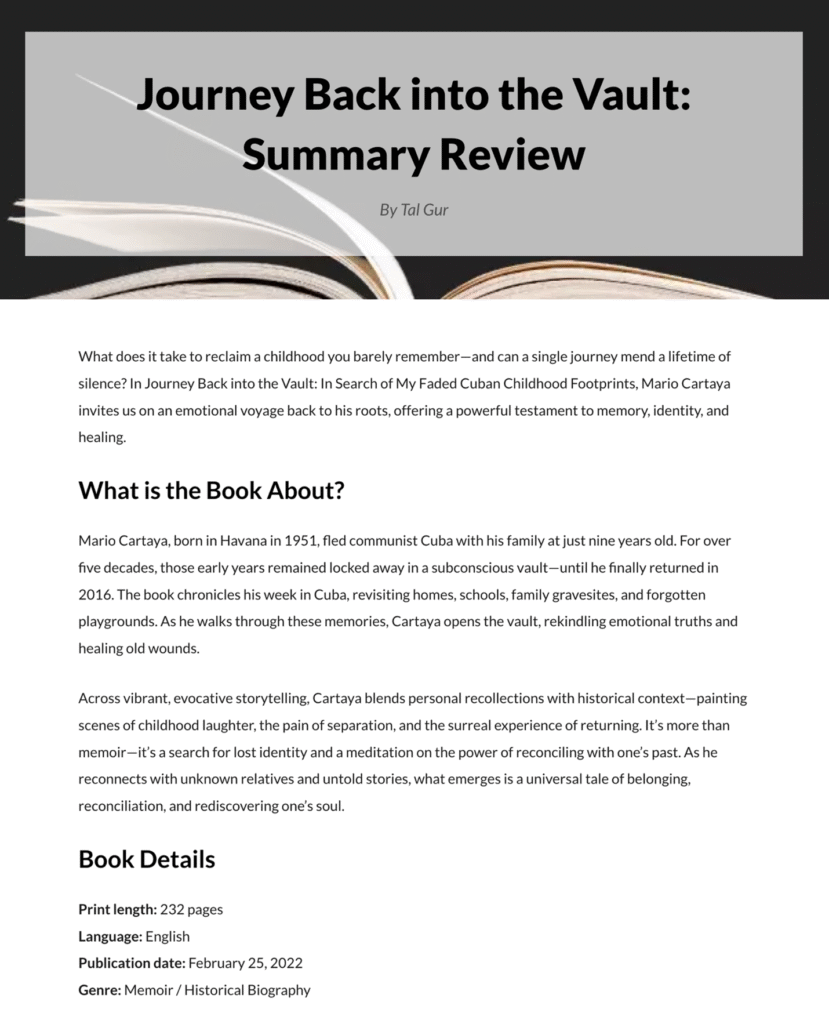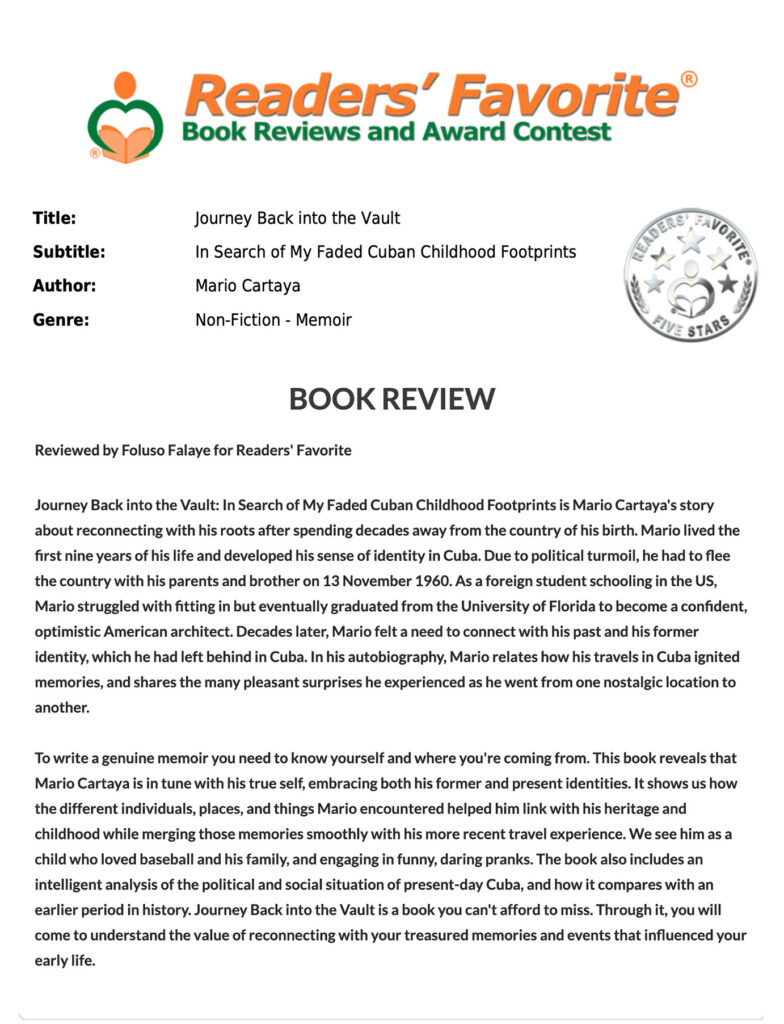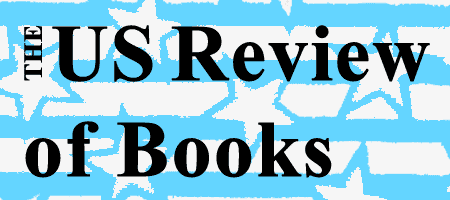Mario Cartaya

Ever wondered what happens when we revisit the places we’ve locked away in our minds? Science tells us that memories don’t fade away; rather, they become distorted over time, reshaped by our evolving perspectives. Journey Back Into The Vault doesn’t just tell a story—it forces readers to confront their own “vaults,” those compartments of the mind where the past lingers, waiting to be reopened.
Much like a neurologist exploring the brain’s hippocampus (where long-term memories are stored), the book invites readers into a space where the past is neither static nor entirely trustworthy. It asks: When we re-examine our histories, do we find truth, or merely another version of a well-rehearsed narrative?
A Narrative of Unfolding Layers
This isn’t a simple walk down memory lane. The book masterfully builds its narrative in layers—like an archeologist dusting off relics, each chapter unveils something that had been buried, either deliberately or by time itself. The storytelling style mirrors the process of cognitive retrieval: fragmented at times, deeply introspective, but ultimately illuminating.
One can’t help but feel a sense of déjà vu while reading. It’s as if the book taps into something deeply universal—a reminder that while the past is unchangeable, our relationship with it isn’t.
The Emotional Science of Nostalgia
Nostalgia, as researchers at the University of Southampton have noted, isn’t just a sentimental indulgence—it serves an emotional function, reinforcing our sense of self and continuity. The way this book handles nostalgia is fascinating; rather than merely romanticizing the past, it challenges the reader to face it, flaws and all.
There’s a careful balance between longing and reckoning. The characters (or real-life individuals, depending on the book’s nature) navigate their own history with an acute awareness that memory is often unreliable, yet undeniably powerful.
Constructive Takeaways
At its core, Journey Back Into The Vault isn’t just about recollecting—it’s about reconciliation. Readers walk away with a profound realization: The past isn’t something we either cling to or escape from; rather, it’s something we negotiate with.
The book subtly encourages a form of cognitive flexibility, the psychological trait that allows us to shift perspectives. In a world where rigid thinking often divides us, this lesson alone makes the book an invaluable read.
Content Warning
While the book remains broadly accessible, it does explore themes of memory, personal reflection, and possibly unresolved conflicts. Readers who find deep introspection or revisiting the past emotionally challenging may want to approach it with a prepared mindset.
Final Thoughts: A Literary Key to the Vault
Some books entertain, others inform, and a rare few challenge us to think differently. Journey Back Into The Vault belongs to the latter category. It doesn’t demand that readers love their past, but it does ask them to confront it. Whether one reads it as a personal exploration or a broader commentary on the nature of memory itself, it is undeniably a book that lingers—long after the last page is turned.



Pacific Book Review
Among other things, a vault is a storehouse for precious things. It is also a final resting place for the dead. For Mario Cartaya, the author of the inspiring memoir Journey Back into the Vault, it is both.
Join him as he returns to his homeland of Cuba, journeying from South Florida in the company of his excellent friends, José and George. Cartaya, an able writer, a canny commentator on his inner life and on geopolitical events, left Cuba at age 9 with his parents and older brother. Now, 59 years later, he returns to see what was left behind.
The family’s forced exile resulted from the events of 1959: the imposition of the Fidel Castro regime, and the near fatal contretemps between Cartaya’s father and the new government. The move, necessitating separation from beloved friends and family, left its scars – unearthed masterfully as Cartaya delves into his unconscious ‘vault’ and retrieves the memories of a lifetime. The result is highly therapeutic.
Dante survived his trip to the underworld thanks to his resourceful guide Virgil. Cartaya’s Virgil is Maidel, a young Cuban driver who escorts the trio to Havana and beyond: a treasure trove of near-forgotten sights and locations that realign Cartaya with his dislocated past. In the process, readers are in for many treats: the descriptions of the food, the music, the verdant splendor of the plantations, of the beaches and mountains, would do a Fodor’s or Michelin’s guide proud.
There are memoirs – and then there are memoirs. Journey Back into the Vault definitely raises the bar. The writing is literate yet conversational, always informed by the acutely insightful intelligence of the author. The ripostes between the ‘boys’ and Cartaya is both exuberant and wistful – people have a habit of calling Cartaya ‘old man’ (he is 63 years young) and testing his marital morality with playful allusions to temptation (young women and drink.) But Cartaya is always in control. His itinerary, including systematic re-visits to his old homes, his childhood school, former national plazas and monuments, is thought out from start to finish. The unveiling of the past is accomplished to the dual benefit of the author and his readers.
This is an ambitious and very effective book. Along with the terrific photos and charming anecdotes, we see present-day Cuba from the sometimes-bitter perspective of those who had to flee. For many, Castro was yet another despot, another despot like the ousted Batista before him. Poverty remains endemic in the island-nation – that apparently hasn’t changed.
The book is also a moving account of one man’s masterful handling of separation, loss, and death. At the end of the day – and the book – Cartaya is deeply affected by his father’s heroic resolve to wrest his family from turmoil. The author’s love for his family (then and now), his two countries, and his past, enlivens every page.


JOURNEY BACK INTO THE VAULT
In Search of My Faded Cuban Childhood Footprints
Mario Cartaya
Xlibris US (232 pp.)
$31.99 hardcover, $2.99 e-book
ISBN: 9781664199293
February 25, 2022
BOOK REVIEW
Themes of family, perseverance, and culture characterize Cartaya’s memoir in this debut.
The author begins his story with a dedication to his father, a hardworking man who led his family to safety in Miami, Florida, amid the chaos of the Cuban revolution. The simple, powerful tribute indicates Cartaya’s resolve to tell his story with unadorned honesty. As a young boy living in Cuba, Cartaya enjoyed a carefree childhood surrounded by family until their political exile following his father’s defiance of military orders to hand over his company’s ledgers. Forced to flee in 1960, the Cartaya family left behind loved ones, traditions, and the only life they knew, with no choice but to abruptly assimilate into American culture. Feeling isolated and invisible, Cartaya created a tightly sealed “vault” of painful memories and a deep longing for home which remained unopened until 56 years later, when, as an adult, he felt ready to examine his past and find himself in the process. The memoir is divided into seven parts—one for each day that Cartaya spent in Cuba on his return visit. During these long, eventful days, Cartaya and a small crew of loyal friends retraced the steps of Cartaya’s childhood. They visited old family homes, the graves of beloved family members, historical sites, and beautiful beaches, each location evoking bittersweet memories. Exploring his past and present through evenly paced and forthright prose (as well as a handful of photographs, likely taken by Cartaya and his immediate family) to help the reader visualize Cartaya’s life then and now, Cartaya takes the reader on a journey of “memories, identity, humanity, and sentiments” from his childhood. He also provides small glimpses into current Cuban culture and politics. Many readers will relate to his urge to find himself and perhaps be inspired to revisit their own childhoods as they read along: “If your path through individualization…is usurped by an event so powerful that it changes the trajectory of your life, thrusting you into a new reality where the truths you once built your life upon no longer apply, then what becomes of you?”
A satisfying and heartwarming autobiographical voyage.

Journey Back into the Vault: In Search of My Faded Cuban Childhood Footprints
by Mario Cartaya
Xlibris
book review by Michelle Jacobs
Cartaya captures the heart of the Cuban diaspora in this moving memoir of his return to the country of his birth after fifty-six years. Born in Havana in 1951, The author fled the country with his family eight years later. This traumatic upheaval has had repercussions throughout his life, both for him and his family. He has found great success in America, but when travel to Cuba became possible under the Obama administration, he felt the pull of his homeland. He embarked on a return journey with the desire to visit the places from his childhood with the hopes of finding closure, connection, and calm.
This chronicle of his trip to Cuba with three faithful friends is rich with descriptive details of neighborhoods, cultural sites, and natural wonders. As Cartaya moves from place to place, he uncovers joyful and painful memories buried deep inside the vault of his heart and mind. Cartaya dedicates an engaging chapter for each day of his seven-day trip. In each place he passes through, he narrates stories from his past and reflects on the present. Along the way, he makes peace with his past and seems to find comfort as he meets his younger self on the streets of Havana.
Deeply nostalgic and searching, Cartaya’s writing is honest and enthralling. He writes with clarity and thoughtfulness and bravely confronts the heartbreak caused by historical forces beyond his control. His search for closure is admirable and always tinged lovingly with joy as he celebrates the best of Havana with his friends in nightclubs, restaurants, and beaches. Cuban coffee, music, and culture are all on display as Cartaya also serves as a knowledgeable travel guide for a newly opened Havana.
RECOMMENDED by the US Review